Science Sonnets
My friend Allison Biehl creates weekly sonnets about different important historical figures in the sciences. For many of her sonnets I have created portrait illustrations of those scientists.
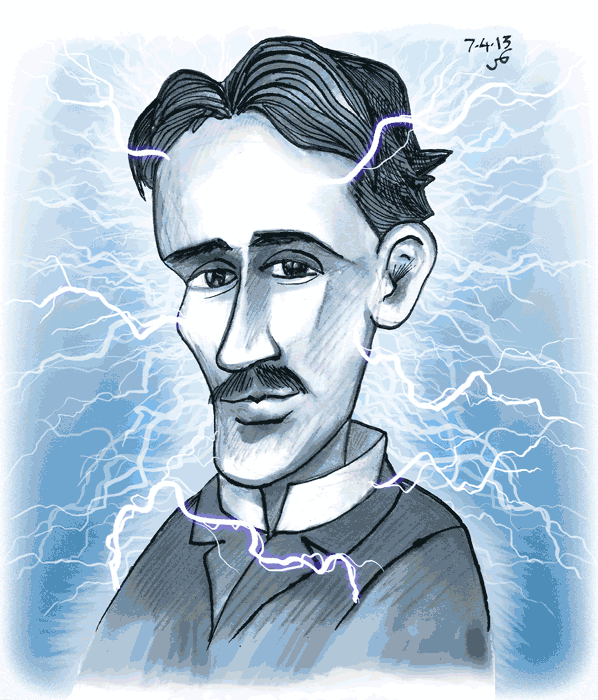
Nikola Tesla
This sickly lad was in and out of school,
But photographic memory allowed
his mastery of maths and language rules;
inventiveness that made his mother proud.
He started work for Edison in France,
and two years later, shipped out for New York.
He quit amid a row about finance,
and Westinghouse stepped in, put him to work.
So Tesla carried on at Wardenclyffe,
explored both x-rays and remote control.
His radio research—a modern whiff.
Three hundred patents—he was on a roll.
He fed the pigeons in his later years,
and hated shaking hands or seeing spheres.
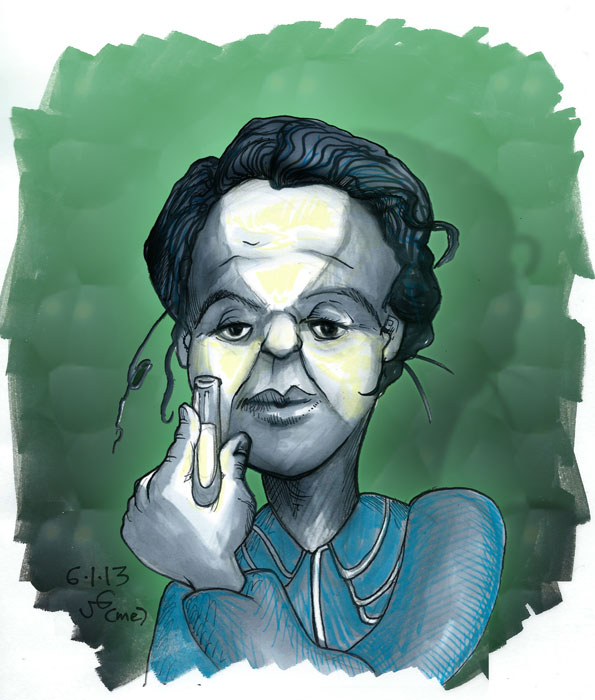
Marie Curie
This Polish woman loved to teach and learn;
attended Flying University.
She tutored, so tuition she could earn,
and later joined Sorbonne in gay Paree.
Discovered radium, with years of toil:
first woman to receive a Nobel Prize.
Polonium, she named for native soil:
in different fields she won the Nobel twice.
She cleaned out wounds in France in WWI
with mobile carts and vials of radon gas
but afterward her health was all undone
from years of handling radioactive mass.
A friend was joking with Pierre Curie,
and said his great discovery was Marie.
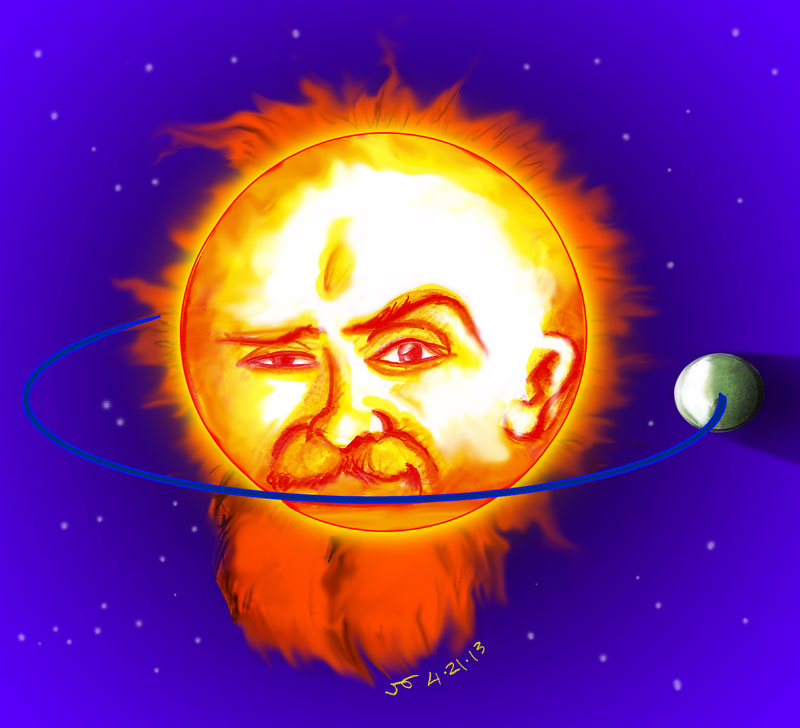
Galileo Galilei
In Florence Galileo made his home.
His father played the lute and fancied math.
He turned his diligence to heaven's dome,
unthinkingly incurring Papal wrath.
He surveyed medicine but was entranced
the day he saw a swinging chandelier.
He studied motion and the planets' dance–
Astronomy counts him a pioneer.
Insisted planets orbited the Sun.
The Inquisition forced him to recant.
His daughter interceded, as a nun,
and promised his own penance she would chant.
Discovered Jupiter's four largest moons;
Observed in detail Saturn and Neptune.
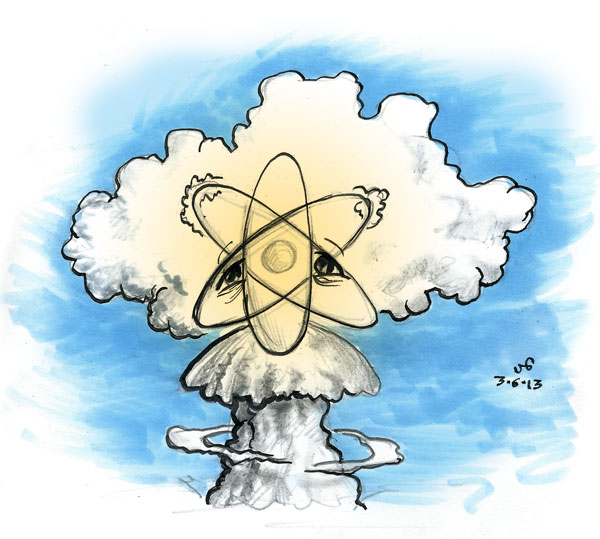
Albert Einstein
Nineteen-oh-five was Einstein's wonder year.
His papers numbered four, in different fields.
He showed that light and time are sometimes queer,
and energy, when slowed down, matter yields.
When energy strikes matter, it reacts.
Electrons are ejected now and then;
so Einstein theorised light in quantum packs:
(hypothesis confirmed by Millikan).
A citizen and traveler of the globe,
he later said he made one great mistake
in pushing for a US weapons probe
that shook a new atomic age awake.
From patent clerk to relativity,
his greatest feat was productivity.
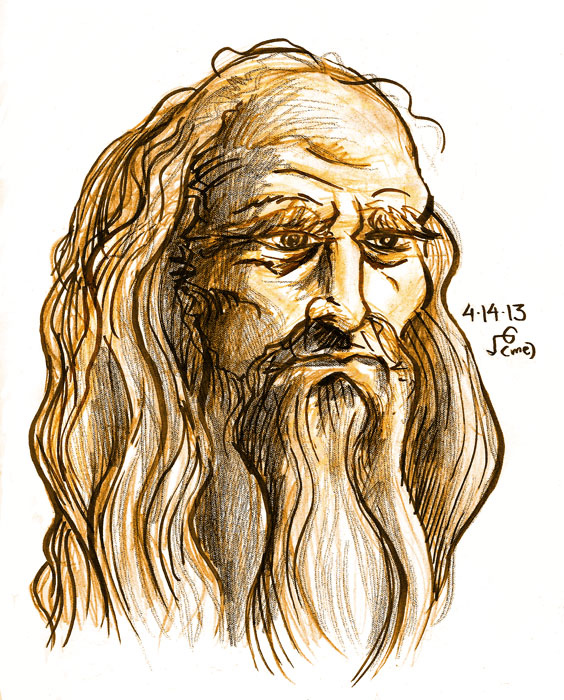
Leonardo da Vinci
The bastard son of notary and wench,
He made machines of war and dreamed of flight.
His curiosity could not be quenched;
In arts and science he was erudite.
He sketched the secrets of anatomy;
Left handedness produced his backwards script.
A favoured artist of the Medici,
His workshop and his mind were well-equipped.
A great procrastinator of his time,
Some paintings were abandoned on the way.
Tho ardour and his art were both sublime,
Slow progress caused his patrons much dismay.
He bought caged birds so he could let them goー
This famous student of Verrocchio.
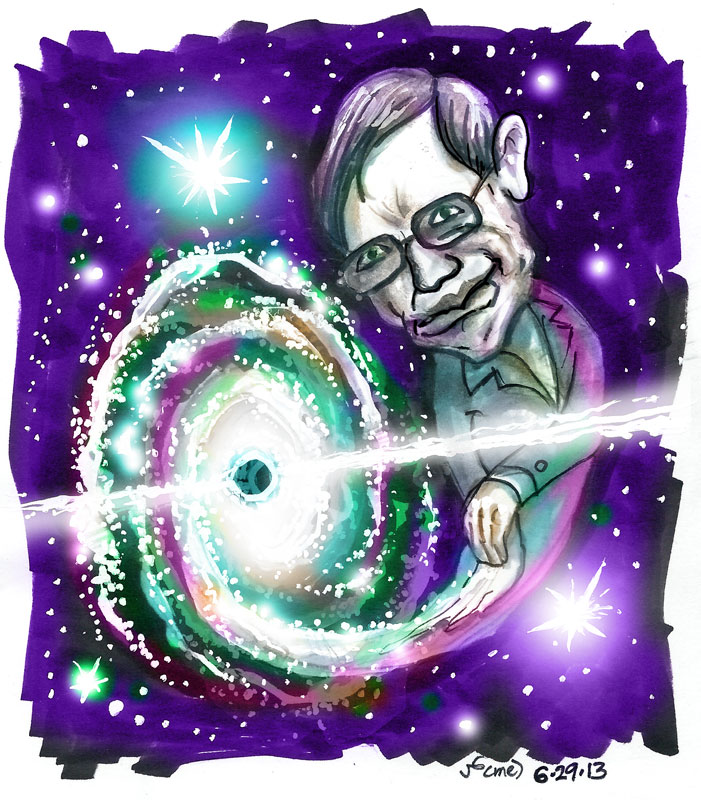
Stephen Hawking
At Oxford, he read physics, chemistry;
outside of class he joined the rowing team.
Went on to Cambridge, earned a PhD;
both profs and students held him in esteem.
His radiation just escapes black holes.
They slowly lose their energy and die.
The Universe's steady growth controls
if forwards or if backwards, time goes by.
Now Stephen Hawking talks with a machine
and makes all kinds of scientific bets.
He wildly drives his wheelchair round the green
and flies around the world in private jets.
"Despite the Cosmos' energy and awe,
God doesn't intervene in natural law."
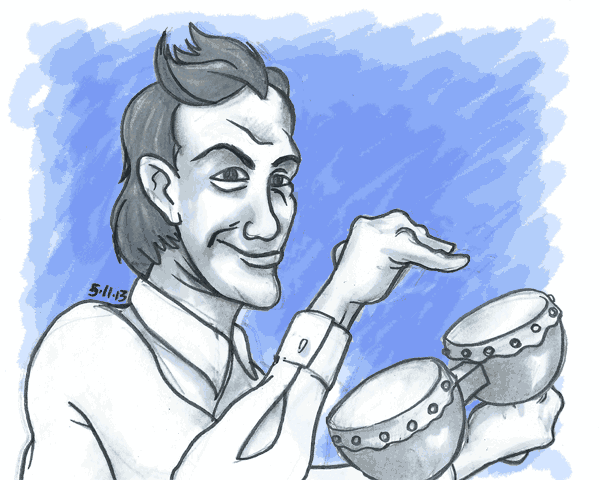
Richard Feynman
Far Rockaway had radios galore,
which Richard Feynman took apart and fixed.
In Princeton math he earned a perfect score,
and took his tea with cream and lemon, mixed.
Then he was transferred to New Mexico;
his wife sent ciphers censors couldn't crack.
A windshield framed his first atomic glow.
He cracked a safe and took his boss aback.
Discovered what made Challenger explode:
an O-ring failed and leaked out rocket fuel.
His diagrams: potential quantum roads.
With women, he refused to play it cool.
Played drums in a parade at Carnaval;
made inquiry the pinnacle of all.
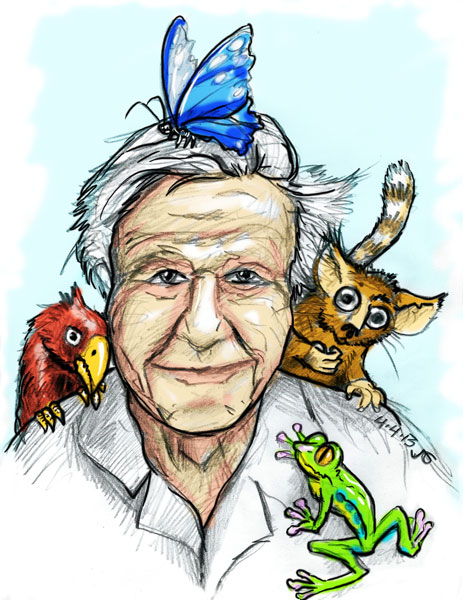
Sir David Attenborough
He tells us of the secret lives of plants,
And shows the world the wonders of the deep.
He narrates Cordyceps devouring ants;
Reveals the things we miss when we're asleep.
When polar bears cross melting, shifting ice
Or lamagayas soar to shatter bones
We see it on a screen before our eyes
And hear the tale in calming, proper tones.
For sixty years, he's served the BBC,
And David Attenborough advocates
A change in how we run society
Before we trash the world and it's too late.
He found a way to show us nature's worth;
It's up to us to honour Mother Earth.

Douglas Adams
When Douglas Adams introduced a Dent
and Prefect, we would never be the same.
His take on Earth– hilariously bent,
and Gently always lived up to his name.
He wrote for Python and for Doctor Who–
of humans and adventures in the sky.
Although his love of deadlines never grew,
he liked the sound as they went whooshing by.
He played with Procol Harum and Pink Floyd
and toured the world to write "Last Chance to See"
before the Baiji dolphin was destroyed
Wherever in the galaxy you prowl–
don't panic and don't ever lose your towel.
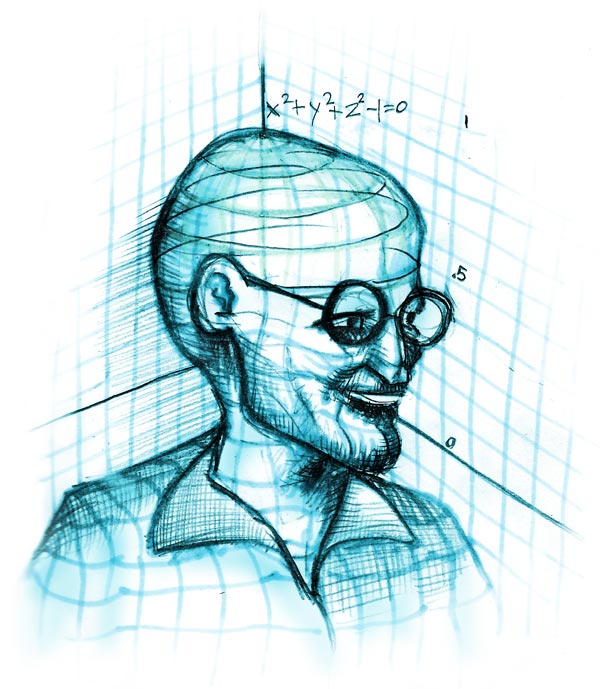
Alexander Grothendieck
A German math'matician raised in France,
his father was a Jewish anarchist.
His mother moved around and took a chance
to keep the family off the Nazis' lists.
He tackled problems of topology,
and Grothendieck laid down a scheme of schemes.
He algebra-i-cised homology;
tracked local data, using sheaves, not reams.
From 1970, his focus turned
to shielding nature and promoting peace.
His prior mathematics work, he burned,
demanding that all human contact cease.
He shut himself away to study dreams,
his path to God as aimless as it seems.
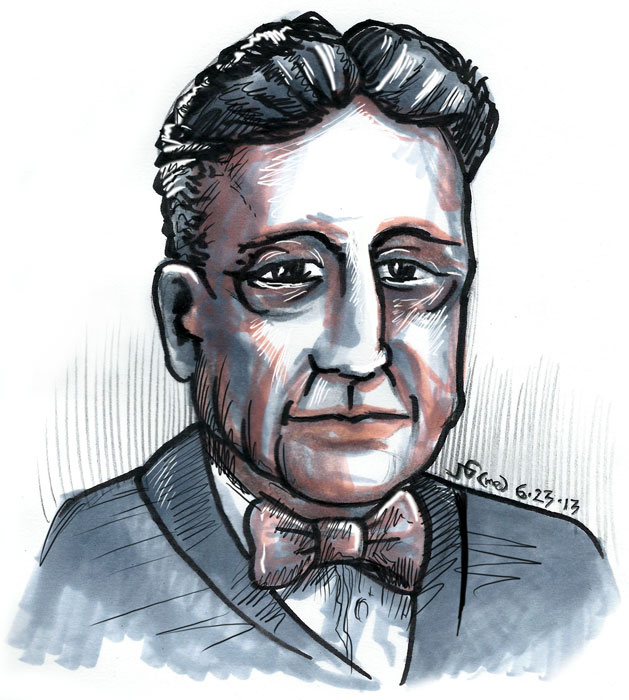
Alfred Kinsey
An Eagle Scout and faithful Methodist,
he studied hard to meet his dad's demands;
but wanted to become a botanist,
and not the engineer his father planned.
Mid-way through college, Kinsey changed his mind,
and switched, to study entomology.
He measured every gall wasp he could find
with conscientious methodology.
His curiosity regarding sex
inspired him to collect and analyse.
Our actions and desires are quite complex:
his work and private life were scrutinised.
His books on sex helped make it less taboo;
he oft enjoyed an academic screw.
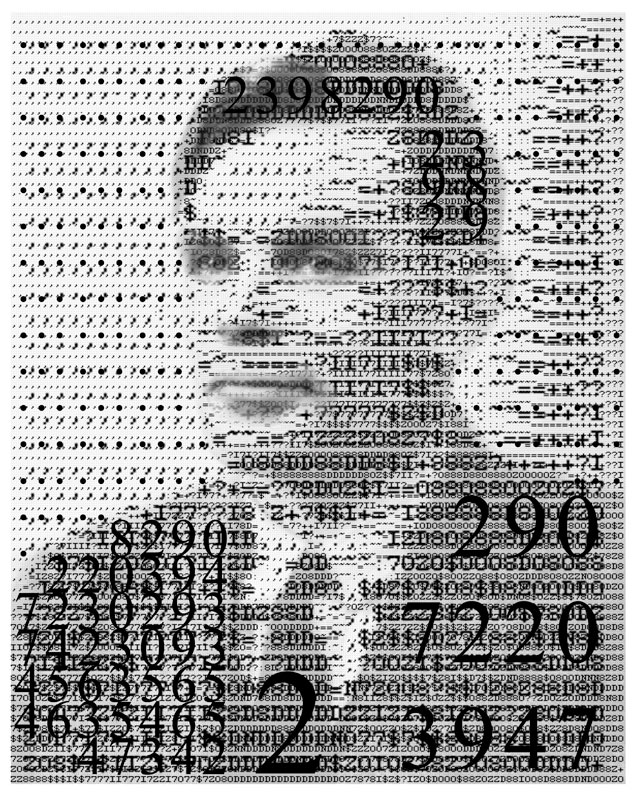
Alan Turing
In World War II he worked at Bletchley Park.
With scant resources, bombe production slowed,
but Churchhill intervened and struck the spark.
They solved Enigma, German U-boat code.
Then Alan Turing's musings on the mind
became the basis for his namesake "test".
If "thinking"'s algorithmically defined,
the implications aren't constrained to chess.
Since homosexuality was still
a criminal offence in Britain then,
his guilt meant loss of job and wasted skill,
and hormone shots to curb his love of men.
His maid found Turing dead of cyanide;
An inquest ruled his death a suicide.
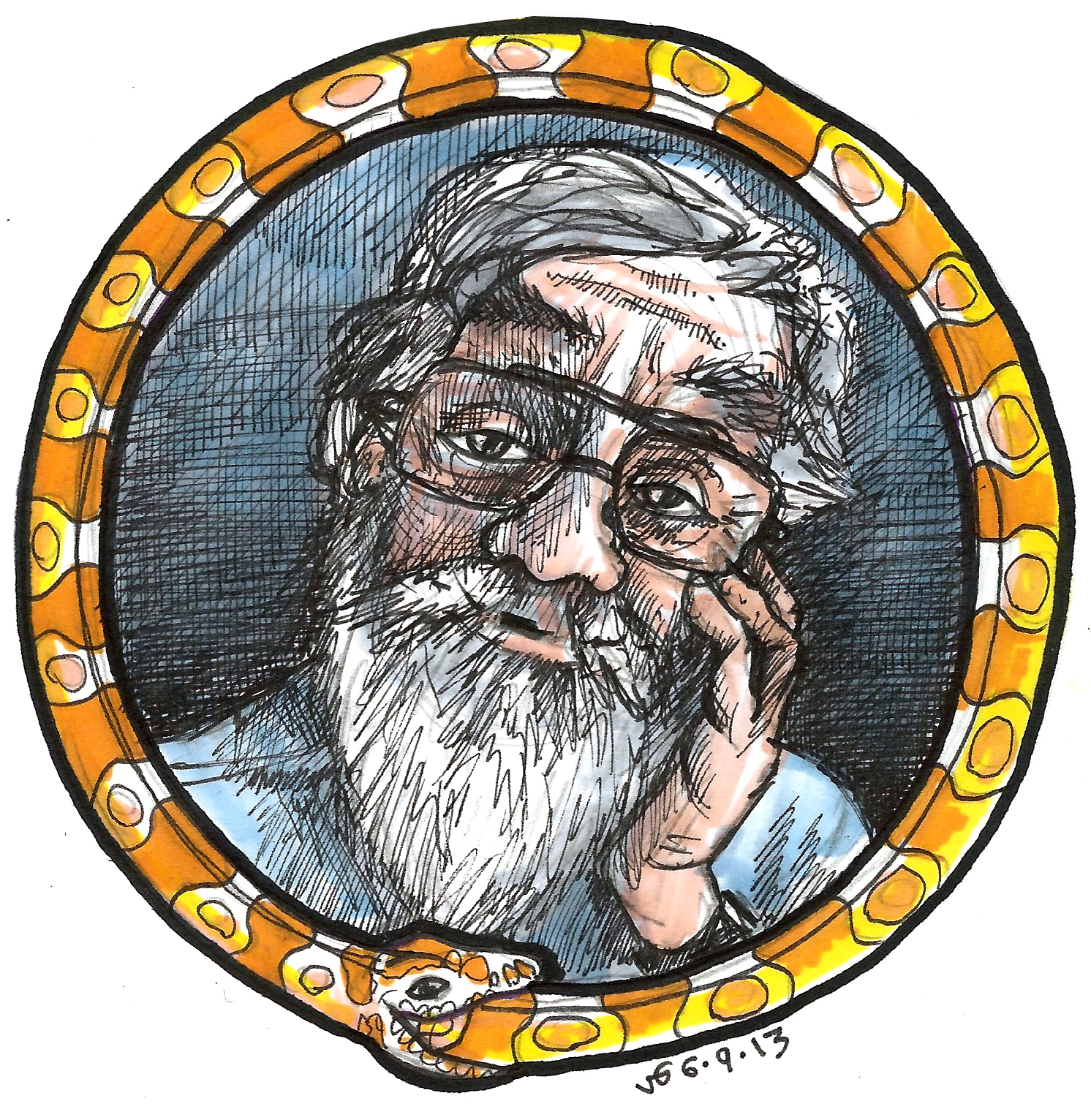
Eric Roger Pianka
Australia's bush is where he feels at home,
with lizards, parasites, the scrub and sun–
where brush fires make a singular biome,
and herp diversity is number one.
Goannas top his list of favourite things.
In fact, there's one named specially for him.
They stalk the earth as undisputed kings
and count Komodo dragons as their kin.
He said the Earth is better off without
so many humans cluttering the place.
We're tasty microbe food, without a doubt,
and we've created hazards we must face.
Pianka's dedication is unmatched;
Long live the lizard lemmas he has hatched!
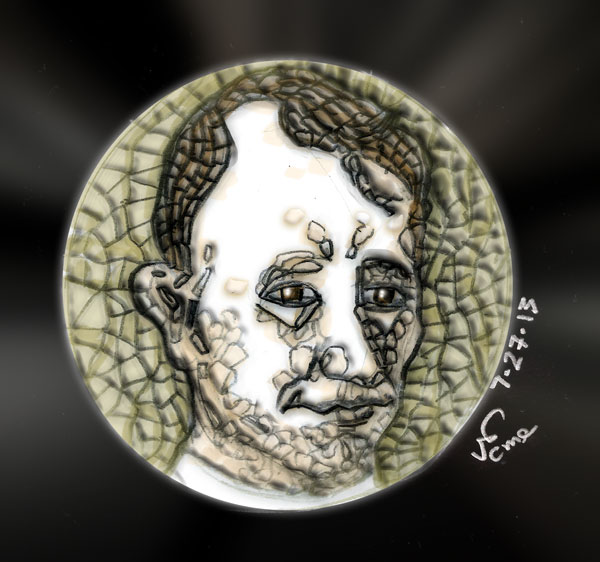
Robert Hooke
A scientist upon the Isle of Wight,
his father thought he should become a priest.
Instead, mechanics gave him great delight,
and as he learned, his eagerness increased.
He revolutionised the spring coil watch
and coined the term for biologic "cells".
He made machines to carve each tooth and notch,
and sketched the shapes of ancient wood and shells.
He helped to rebuild London after fire;
along with Wren, he'd survey and create—
but had a rep for secrecy and ire,
and then a spat with Newton sealed his fate.
Forgotten, then remembered, memory—
his lost and rediscovered history.
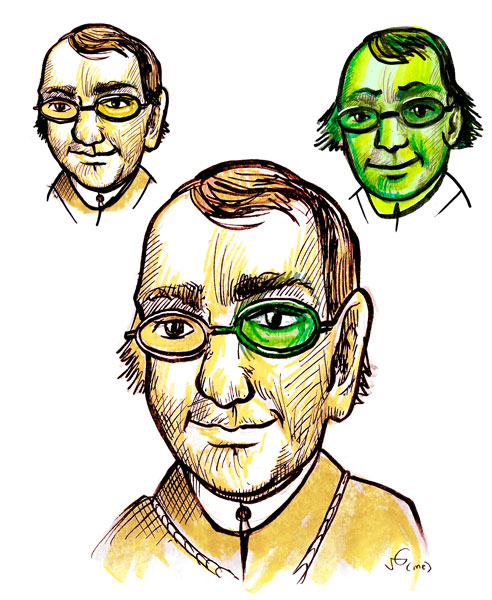
Gregor Johann Mendel
"The Father of Genetics", as he's known,
a German monk who wondered at the world.
His pea plants—tens of thousands— all home-grown,
his notions and their leaves alike, unfurled.
He first observed the pods and seeds of peas,
and noted then that certain traits stand out.
Too difficult: the task of mating bees.
He'd have to be content to watch seeds sprout.
The colour and the shape a cross produced
depended on the strength of unlinked genes,
and Gregor Mendel finally deduced
that there's no blending of the parent beans.
Though in his lifetime he remained obscure,
genetic laws, when tested, still endure.